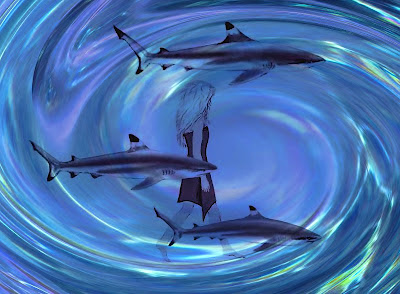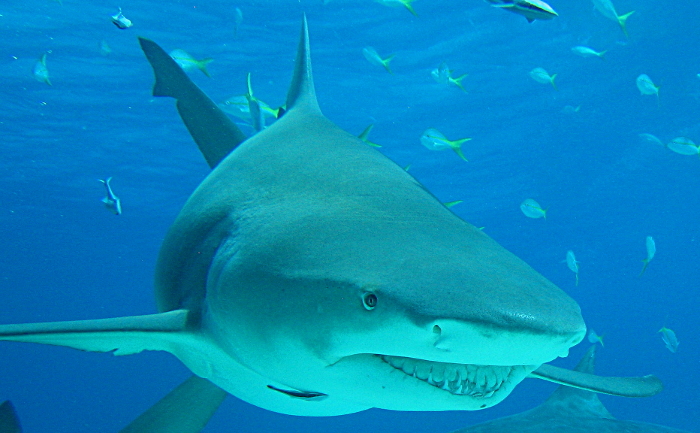Fear of Sharks? A Comment on Aggression and Compassion in Humans and Animals
When I give talks about my
study of shark behaviour, the most common question I am asked is :
“But weren't you afraid of the
sharks?”
Well of course, but to me,
those sharks were simply wild animals. I had often been fearful,
during my long history of observing wild animals, but never
had an animal threatened me.
On the contrary, I learned
at an early age that it was the men in the forest, not bears, not
mountain lions, not snakes, who were really dangerous. When I was
growing up in North America, there was one serial killer after
another in the local news. Every couple of months, another girl or
young woman would be found, naked, bruised, and bloody after a
nightmare death, in some dark corner of the forest, to the shock of
her weeping family.
Those were the monsters who
lay in wait along my pathways, as a young wildlife artist and
ethologist. The first time I had to run for my life, I was only four
years old. At twelve, I was grabbed by a strange man while walking
home through a local wood, and only escaped after a desperate
struggle. Every few years, there was a terrifying, life-threatening
incident, always with a man, never with an animal.
Except for one time, and
that animal spared me, though it had just been mortally wounded by a
man.
It happened at
the end of September five years ago. I
had been travelling by bicycle across
France, and stopped
for the night in La Forêt d'Ancenis.
But I
noticed that in that forest only, no
birds sang.
As it grew dark, volleys of
gunfire began to shatter the stillness, and with the fall of night,
came an alarming crescendo—many big guns were being fired
repeatedly nearby. The deafening sound went on and on, as if I was in
a war.
Then suddenly an animal came
crashing through the trees, and in the charcoal shadows I could
scarcely make out something the size of a large dog. It veered around
me. The sound of its feet striking the ground sounded like a horse
running very unevenly. Perhaps one limb was useless, so it came down
hard on the other. Its voice was a series of high barks, but it was
not a dog. It settled on the ground nearby, where it lay yipping and
crying, as more animals could be heard, crashing through the woods
from the direction of the gunfire.
The night had enveloped us
when a much larger creature—a different species—came crashing,
groaning loudly with each step. It came right up to me and began
snorting and pawing the ground in front of my face, as I gazed up
into blackness from my sleeping bag, every nerve alight with terror.
For long minutes it went on striking the ground, sniffing and
exhaling in sharp bursts between its agonized groans—my impression
was of an animal the size of a bull. Fully expecting to be mauled at
any moment, I was awed when, very gradually, its intensity began to
ebb. There was more time between each snort, and finally it took a
step back. Then it retreated a few metres away, and lay down, where
it went on moaning and crying to itself.
The two wounded and
terrified creatures had settled down near me, as if they thought that
they had found safety! They knew people. No such wild animals lived
in that forest—no wild animal would behave like that. Wild animals
would have known where to go to hide. These had no idea what to do.
It was clear that they had been brought there, and likely released
just before the gunfire had begun. A large gathering of men had fired
at them repeatedly with big guns at close range, apparently just to
terrify and hurt them as they fled into the forest.
One of them passed me at a
canter from time to time, crashing through the darkness and yelling
in an unearthly voice. It was not as badly injured as the others—all
four legs still worked, and its lungs and internal organs were also
functioning.
I called the police, but
they were unconcerned. They refused to notify the hunters that I was
there. It was the killers, who were in the right, according to French
society. I had seen the graceful lawns of the Château d'Ancenis les
Bois, which lay beyond the gunfire, swans and ducks floating on the
pond in front of the castle.
They were the nobles of
society. Noble? The wounded buck, bear, or bull, whatever it was, had
offered me more mercy than it had been shown, and in the morning,
these cruel men would be coming with their dogs to satiate their
sadism on their victims, with the blessing of the local police. I lay
awake all night, listening to the groans and cries of the animals,
and thinking.
You can do a lot of thinking
during the black hours of a night. For a student of wild animal
behaviour, the conclusion was hard to avoid. My own species was the
most violent, cruel and dangerous one of all. And it was not just the
activities of serial killers and recreational hunters in the balance.
I had regularly witnessed irrational, violent, and cruel behaviour
among individuals I knew. In families it was common, and often
accepted by other family members, so from there it was a short step
to acceptance in school, where bullies dominated the scene. But
though they caused a great deal of suffering in their victims, the
situation was accepted by other students and the teachers, so the
scene was set for also accepting injustice in society, where we are
expected to turn a blind eye to countless injustices and cruelties,
from agribusiness to war.
Scientists have found
through animal experimentation, that their lab animals are more
compassionate than they are, for example, and any examination of
history shows centuries of bloody conflict with no counterpart in
nature.
In recent decades, the
study of ethology, or natural wild
animal behaviour, has revealed universal
tendencies
that are common across the various families of complex animals. These
show that our violence and aggression evolved with us from the animal
state. While humanity has over-estimated the force of instinct in
animals, it seems that it
has under-estimated the same
power in
humans. Anyone can enter murder-mode given the right circumstances.
And now, with the science
fiction weapons available to us to use on those we don't like, our
future safety as a species is called into question. What might have
once helped us to succeed—the instantaneous and excessive violent
response—now threatens us with extinction. But, this angle on
humanity is only rarely mentioned.
Biologist David Carrier, of
the University of Utah, was quoted recently in LiveScience as saying,
"My personal opinion is that Western society, as a whole, is in
mass denial about the magnitude of the problem that violence
represents for the future. We are peace-loving and want to believe
that the violence and transgressions of the past will not return, but
recent history and current events illustrate how easy it is for
humans to respond with interpersonal and intergroup violence."
Some writers speak of an "awakening" before it is too late, as human destruction threatens the very health of the planet. Such a phenomenon would necessarily involve the conscious choice of humanity to over-ride their instincts and use their intellect to make decisions. Can a species change? Perhaps that is the final test of the human spirit.
So, to
answer those who wonder about my fear of sharks, after
some of the homosaps I have known, sharks were easy, I
mean really simple, to deal with.
(c) Ila France Porcher 2015




Comments